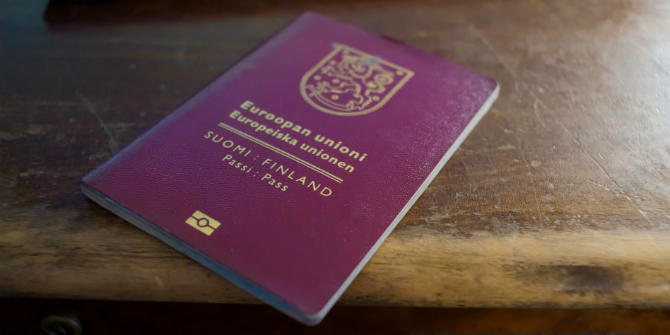After a quarter of flat GDP growth, Britain’s economy was hardly in the best position to weather the COVID-19 storm. The prospect of a disorderly Brexit will dent market confidence even further, writes Callum Tindall (University of Nottingham). The government has a duty to ask for an extension so negotiators have enough time to reach a deal.
On 12 March, the FTSE 100 (index of the 100 largest UK companies) dropped 10.9% – its highest single-day fall since 1987. This follows flat GDP growth in Q4 2019, with almost certain decline expected in Q1 2020. The spread of COVID-19 means investors are extremely pessimistic about the outlook for the economy.

And if a deal cannot be reached, Brexit poses a further economic challenge. Market stability is important, as most British citizens are investors through pensions and there is an ongoing risk of business failures.
The UK government began with a paternalistic role, reinforcing the need for good personal responsibility, hygiene and self-isolation if required. The Budget initially committed £12bn to combating COVID-19 to support public services, provide sick pay and business rates relief for small and medium-size businesses. This was followed by a huge injection of £350bn to support businesses, which could further extend as the government vows to do “whatever it takes”.
The Bank of England has cut UK interested rates to a historic low of 0.1%, leaving almost no room for further movement. Following action by the European Central Bank, this was supported by an initial quantitative easing programme adding £200bn into the economy. With ongoing supply-side issues, it’s unclear how effective this will be.
Most of the UK’s consumer economic activity will be suspended by social distancing, so these measures will be welcomed. However, buses, trains and airlines are already vulnerable to Brexit uncertainty and are likely to need additional assistance. Without support, business collapse could cause job losses and further reduce consumer supply, creating a downward spiral of economic contagion.
Those at greatest threat from economic disruption are individuals living in precarity. The government’s £350bn measures cover businesses, but not people. There are almost a million UK workers on zero-hour contracts, without access to full sick pay. Many are living hand-to-mouth and cannot afford income losses. Another government consideration must be for the five million self-employed. Both these groups have yet to be provided enhanced income support, but can claim Universal Credit if unable to work. However, this takes five weeks to receive, and entitles recipients to less than £100 a week per person. There have been calls to introduce a temporary universal basic income to help these people. Additionally, a quarter of British people have insufficient savings. Whilst wealthier peers stockpile non-perishable goods in anticipation of potential quarantine, these people risk food shortages. Also particularly vulnerable are the elderly and disabled.
Throughout this crisis, Brexit negotiations have to be resolved. For all that cannot be predicted about COVID-19, there is much known about Brexit. The transition period following the UK’s exit is due to end on 31st December 2020. The EU has presented a draft treaty outlining its position, although the next round of negotiations has been cancelled – jeopardising a potential resolution in the current timeframe. Boris Johnson has previously indicated COVID-19 disruption will not derail negotiations, suggesting an extension is “not happening”. Foreign Secretary Dominic Raab reinforced the message. Whitehall insiders have nonetheless suggested that the UK may nevertheless be preparing for an extension, which must be decided by 1 July. The Labour leadership contender Lisa Nandy has called for an extension of the transition period, although the frontrunner Keir Starmer has not yet done so. These mixed messages only add to the confusion.
As COVID-19 continues to rampage across Europe, trade talks are naturally of lesser importance than high death tolls and economic shutdown. An extension – perhaps of six months – would be a wise move. It would indicate the UK’s prudent approach to crisis-management and instil confidence in its desire to get a well-constructed deal in the national interest.
Importantly, agreeing an extension does not mean it must be used, but provides a sensible contingency. With only a few months left until the extension deadline and so much unknown about COVID-19, it would quell fears of a second economic slump caused by a no deal exit. While a backlash is likely – as Brexit will have dragged on for almost 5 years – this international emergency cannot be allowed to facilitate a crash out of the EU. Every effort should be made to reduce the market impact of leaving. It also reminds us of the importance of working with neighbouring countries in order effectively manage crises, particularly the European Medicines Agency. In terms of economic relationships, potential loss of further EU trade from a no-deal Brexit at the end of the year could spell disaster when the UK economy will be in a state of recovery. We do not know when the market will bottom out, but for investors with the luxury of time, market wisdom suggests economic recovery will follow. Consumer confidence is likely to return once the COVID-19 threat has abated, if economic order can be restored. While the government must act in line with health experts to limit contagion, alongside the Bank of England it has a role in maintaining economic stability in these volatile times. This includes the prudent measure of extending the Brexit deadline as a contingency.
This post represents the views of the author and not those of the Brexit blog, nor LSE.







Very good article, thanks, also the decline in the value of GBP is a factor.
Stay safe, young brother.
The first requirement for this country is cheap food for the economically disadvantaged.
The second: cheaper medical supplies for the health service
The third: enhanced trading opportunities with the global marketplace
The fourth: a mutually advantageous tariff regime with our immediate neighbours.
All of these militate towards a trade agreement with the eu in place just as soon as possible; something that would be greatly facilitated by no extension to the purgatorial transition period.
By cheap food you mean hormone beef and chlorinated chicken and mechanically recovered meat.